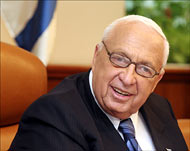Putin sees chance for regional peace
President Vladimir Putin, the first Russian leader to visit Israel, has hailed an opportunity to bring peace to the Middle East and says he is anxious to bolster security cooperation with Israel.

The Russian leader played down Israeli criticism on Thursday, saying that Russia‘s planned sale of anti-aircraft missiles to Syria and supply of nuclear components to Iran does not threaten Israel‘s security.
He also pledged to tackle the growing problem of anti-Semitism in his country.
Putin spoke on the second day of his historic visit to Israel.
The trip was intended to cement Russia‘s rapprochement with Israel and boost its profile in the international arena.
Putin was greeted on Thursday morning by the pomp of an official welcoming ceremony, complete with a military honour guard and Jewish, Muslim and Christian religious leaders.
Russian relations
But the visit was shadowed by disagreements with Israel over Russia‘s aid to Syria and Iran, two of Israel‘s staunchest enemies.
Russia has provided assistance for Iran‘s nuclear programme and has agreed to sell anti-aircraft missiles to Syria.
 |
|
Sharon says Russian-supplied |
Israeli Prime Minister Ariel Sharon has said repeatedly the missiles pose a danger to Israel and wants Putin to halt the deal.
Israeli Vice Premier Ehud Olmert said on Thursday that Russia is selling Iran components that can be used to make non-conventional weapons and that Russia‘s assistance to Iran is a cause for concern.
Israel accuses Iran of pursuing nuclear weapons, though Tehran says its nuclear programme is for peaceful purposes only.
“His deal with Iran is not just an arms deal,” Olmert told Army Radio on Thursday, referring to Putin. “He also supplies Iran with components that could be used for possible production of non-conventional weapons.”
US announcement
The US announced on Wednesday it had authorised the sale of as many as 100 large bunker-buster bombs to Israel, which experts saw as a warning to Iran about its nuclear ambitions.
|
“I agree that these steps are not enough and we have to get Iran to agree to nuclear inspections” Vladimir Putin, |
Putin defended the moves in talks with Katsav, who holds a largely ceremonial role, saying that Russia was sensitive to Israel‘s security concerns.
“Regarding Iran, we are working to make sure their nuclear ability is used for peaceful means,” Putin said.
The agreement with Iran requires it to return all its spent nuclear fuel to Russia so it cannot be used for military purposes, Putin said.
“I agree that these steps are not enough and we have to get Iran to agree to nuclear inspections,” he said at a joint news conference in Jerusalem with Katsav.
He also sought to allay concerns about the Syrian arms deal, saying the missiles should pose no threat to Israel.
Missile safety
“The missiles we are providing to Syria are short-range anti-aircraft missiles that cannot reach Israeli territory,” Putin said. “To come within their range, you would have to attack Syria. Do you want to do that?”
Israeli warplanes bombed alleged fighter training bases outside Damascus on 5 October 2003, and have buzzed one of Syrian President Bashar al-Assad’s palaces.
Putin said he had vetoed the sale of longer-range missiles to Syria out of concern for Israel‘s safety.
Israeli media reported Thursday that Sharon also opposes Russia‘s plan to sell military equipment to the Palestinians.
Palestinian officials have said Russia is interested in selling armoured vehicles to their security services for use in riot control. Israel fears the armoured vehicles could fall into the hands of armed factions.
Middle East peace
Putin began his visit late on Wednesday on a note of controversy, proposing just before his arrival that Russia host a Middle East peace conference in autumn, after Israel withdraws from the Gaza Strip.
|
“The key to the solution of this conflict lies in continuing the dialogue that started recently” |
Palestinians warmly embraced the idea, but Israel and the US brushed it aside.
He did not bring up the conference proposal during Thursday’s news conference with Katsav but said there was a unique opportunity to achieve peace in the region.
“Today there is a chance to end the long Israeli-Palestinian conflict. The key to the solution of this conflict lies in continuing the dialogue that started recently,” Putin said.
Condemnation
In an official statement, Israel and Russia said they “unreservedly condemn all acts, methods and practices of terrorism” which they called “one of, if not the most, dangerous challenge to mankind”.
“We have a common responsibility to fight against anti-Semitism and against deadly terrorism,” Katsav added, paying tribute to the role played by the Soviet Red Army in defeating Nazi troops during World War II.